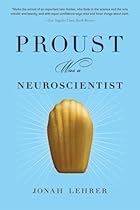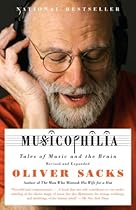When I joined the 2009 Science Book Challenge, I didn’t intend to focus on neuroscience, but it turns out that that branch of science is absolutely fascinating to me. These two books I read really have convinced me that science and art are inextricably related each other, for art is perceived and appreciated by the brain.
I think I’d say the Lehrer was my preferred of these two, only because I hadn’t realized the Sacks was abridged. At any rate, I enjoyed both books and would love to revisit either other again in the future.
Proust was a Neuroscientist by Jonah Lehrer
 Jonah Lehrer writes about some of the giants of the humanities as if they were neuroscientists, a hundred years ahead of their time. I found myself eager to read, eat, visit a museum, and listen to the music of the artists he discusses. It was truly fascinating, and it showed me that science and humanities really do go hand in hand.
Jonah Lehrer writes about some of the giants of the humanities as if they were neuroscientists, a hundred years ahead of their time. I found myself eager to read, eat, visit a museum, and listen to the music of the artists he discusses. It was truly fascinating, and it showed me that science and humanities really do go hand in hand.
I was fascinated to hear a scientists’ perspective about Proust’s understanding of memory in In Search of Lost Time. While I haven’t read the books, I have had my own memories. Lehrer’s commentary actually got me excited to read Proust’s masterwork! Lehrer also talked about Escoffier’s innate understanding of taste and the pleasures of eating, and in retrospect, I think this is what got me on my current “Spice of Life” kick (i.e., reading more books for my own Spice of Life Challenge). When he talked about Cezanne’s painting style as a commentary on how we see and Stravinsky’s music as a commentary on how we listen to music, I had to come and find some examples of Cezanne and Stravinsky.
Not surprisingly, Stravinsky’s Rites of Spring does not sound all that dissonant to me. It is amazing to think it caused rioting on opening night because it was so disturbingly different. In fact, not 30 years after the rioting opening night, Disney adapted it for Fantasia. (This is the first 7 1/2 minutes of Fantasia‘s version.)
Lehrer also discusses Whitman in terms of “Feeling”; Eliot in terms of “Freedom” (the only chapter I didn’t really understand); Gertrude Stein in terms of “language”; and Virginia Woolf in terms of “self.”
In the acknowledgments, Lehrer says that while he dreamed of being a research neuroscientist, he quickly realized he “wasn’t good enough.” I have to say that his ability to bring neuroscience down to an understandable level for this lay-person was certainly good enough. In fact, it was excellent!
Musicophilia by Oliver Sacks
 I loved learning about music from Oliver Sacks’ neuroscientific perspective. Although Sacks’ is obviously a very well-renowned scientist, his book made the scientific process very easy to approach. This book is a great start for a nonscientific person like myself! (I may have to copy Eva in reading all his books!)
I loved learning about music from Oliver Sacks’ neuroscientific perspective. Although Sacks’ is obviously a very well-renowned scientist, his book made the scientific process very easy to approach. This book is a great start for a nonscientific person like myself! (I may have to copy Eva in reading all his books!)
However, let me just say from the get go of this review that I was horrified to learn, after the last track of the audiobook ended and the audio-producer spoke, that what I had just listened to was an ABRIDGMENT. I was so mad, for it says nothing of the sort on the cover. I look for that, and I always make sure my audiobooks are not abridged. Now I wish I had not listened to this, for I would have loved to read all of it.
I consider myself a musical person. Although I cannot listen to music while doing brain intensive things (such as studying when I was a student) I do love music and I love singing. I lead music for the young children at church, and occasionally I’ve been in choirs. All of Oliver Sacks’ stories, then, were quite interesting to me as his book contained, as the subtitle suggested, “Tales of Music and the Brain.”
He begins by talking about all the disturbing things about music: non-musical people who, after being struck by lightning, now play the piano; people who have seizures when a particular type of music is heard; the songs that get in our head and don’t go away; musical hallucinations in which people hear loud music, even when there is no music playing anywhere. These sections were most challenging to listen to, because I felt it made me wonder how I’d cope if music were a disturbing influence in my life, rather than a pleasant one.
In the next section, Sacks focuses on the different ranges of musicality in people. On one side, some people are musical geniuses. Others have perfect pitch (incidentally, those that grew up speaking a tonal language as a first language are more likely to have perfect pitch). On the other hand, some people have amusia, where they cannot hear music properly. Sacks discusses impact of cochlear amusia (when people age and therefore become hard of hearing) and people that go through occasional and seemingly random amusia at various points of his life. I can see why he’s so interested in the subject, since he mentions having had amusiac experiences in his life!
The last bit of the audiobook focused the impact of music therapy on people with various illnesses and struggles. People with severe amnesia – so severe they cannot remember more than 15 seconds – found they could still sit at a piano and play something from beginning to end. Those with severe dementia, who could not have a coherent conversation, likewise could sing a song from beginning to end. These aren’t people that have had musical training, per se, but the impact of music on a person’s life is apparently enough to bring them back to reality, even if only briefly.
Sacks obviously talked about a lot more than I’ve mentioned here. But that last bit is what stood out to me most. Even without having musical training, having perfect pitch, or being some kind of musical savant, having music in our life brings us to a different state of being. It can help us find emotional grounding, and that is enough for me to want to keep beautiful music in my home!
Do you like music?
Have you ever considered art from the perspective of neuroscience?





P.S. I played the song and video for my son. He says, “No! No!”
I think that because I do neuroscientific research professionally, I have a harder time with books pitched towards the general public on the subject. In part, I think it’s because I am investigating the brain 8 – 10 hours a day, and so in my free time I want to do something different… And then there is the fact that as a scientist, we get trained rather rigorously to latch on to inconsistencies or generalizations and to essentially tear claims by other scientists apart, and it can be hard for me to turn that part of my own brain off and not be in “uber critical mode”, so when something gets simplified for those who aren’t expected to be experts on the subject, well, it often causes me to say “Buuuuut, that’s not really true, not exactly…” And it’s annoying, I realize, and so generally I steer clear of these books, for my sake and others! But I do always get a thrill when people read something about my little corner of the world and are excited and interested by it. And it’s always nice to feel like psychology and the brain, notoriously considered “soft science”, are gradually gaining increasing prominence for scientifically rigorous work!
Hey, I bought that Musicophilia book for my husband, because I thought he might find it interesting. He is a music teacher.
Yes, I like music. I was a band nerd for many years. Obviously, I met my husband in the band.
Funny story about this book! Remember when he talks about music hallucinations and how it’s different from getting a song stuck in your head? Well, I read that part out loud to my sister, who was 13 at the time, and she flipped out. She said, “Oh, my God, that’s happened to me! I’ve been in the car with my mom and asked her to turn down the music because it was so loud. Everyone in the car looked at me like I was crazy.” So I kept reading and it turns out that it is a symptom of lymes disease, which she was diagnosed with a few months before. It was just so neat to see what Sacks was talking about in the real world, not that I was excited that my sister was hallucinating, but she thought it was pretty cool!
Yay! Lehrer has another book out now about choices, with ice cream cones on the cover. 🙂 I haven’t read it yet, but I have another neuroscience Proust book out right now about how our brains read. 😀
I love that we both reviewed Sacks today 😀 I so need to get my hands on Musicophilia. The essays in The Man Who Mistook His Wife for a Hat that dealt with music were some of my favourites.
Proust was a Neuroscientist sounds like something I’d really enjoy too.
Musicophilia is one of those books that I couldn’t stop telling people about while I was reading it. Lu’s story above about her sister and lymes disease is really crazy! I found some of the stories in that book so touching–especially the ones that involved people going through a difficult time (dementia, physical therapy) that use music to help them out.
I can’t remember if I said this already, but How We Decide (Lehrer’s new book) is pretty awesome. It will mess with your head.
Boyfriend and I got to see Lehrer speak on campus a few weeks ago and he was excellent. Like you said, he does a great job of explaining things in a way that makes sense to people who don’t study the brain a lot. I want to read one of his books, it just hasn’t made the trek from the library to my apartment to my to-read pile just yet.
Steph, I did NOT know that you work in this field! How interesting. I can understand not wanting to read “pop science” books about it then! I did enjoy these from my corner of non-science understanding
Haiku Amy, He’ll probably love this book!
Lu, oh wow, crazy story!!
Eva, I have that book on my list too — is it by Maryanne Woolf? I’ll look forward to hearing your thoughts on it.
Nymeth, I think you’d enjoy both of these!
Marie, it was a fascinating book so I can understand wanting to tell everyone about it. And it sounds like Lehrer’s other book is pretty cool too! Thanks for the rec.
I love accessible books about neuroscience, it is such a fascinating subject. I have the Proust book in a pile of books somewhere. I was so excited to read it when it came out and then never managed it. I enjoy listening to musci when I am doing stuff around the house but other than that I don’t listen much because I’d rather be reading 🙂